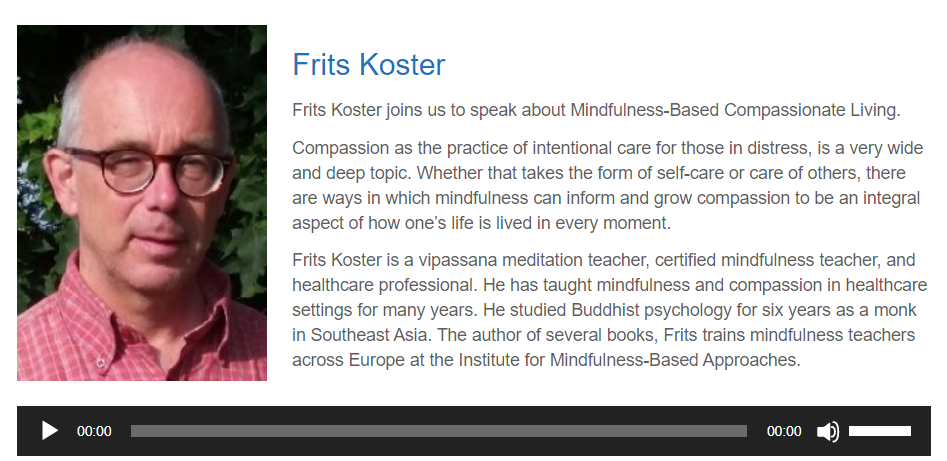In many countries, two types of compassion training are being offered: Mindfulness-based Compassionate Living (MBCL) and Mindful Self Compassion (MSC). Both programmes consist of eight sessions and an extra session in silence and intend to cultivate compassion. MSC has been developed by Kristin Neff, who is a pioneering researcher of self-compassion, and clinical psychologist Christopher Germer, who is an expert in the field of meditation and psychotherapy. One of our compassion trainers, Ali Lambie, has created a very useful YouTube video that explains in detail the principles behind MSC and how it works. We highly recommend that you watch the video, since will answer many questions that you might have. MBCL has been developed from the close cooperation of two pioneering mindfulness teachers in the Netherlands (psychiatrist and psychotherapist Erik van den Brink and meditation teacher Frits Koster) based on their extensive experience in working with MBSR and MBCT in mental health care. In their programme, they have integrated elements derived from the developers of MSC as well as Gilbert’s Compassion Focused Therapy (CFT), building on an evolutionary model of the human mind. MBCL is recognised as a follow-on course following foundational mindfulness-based programmes (MBSR, MBCT or equivalent) by BAMBA and VMBN (the Netherlands based mindfulness teaching network). You can listen to Frits Koster talking about MBCL in this podcast from Present Moment:
What they have in common: How they differ:
Both trainings highlight the value of mindfulness practice. MSC states that familiarity with the practice of mindfulness is recommended, whereas MBCL considers it as a requirement. Developers of both programmes emphasise that personality, style and embodiment of the teacher are often more important than the curriculum offered. Both training programmes are, like other compassion training programmes, valuable in their own right and it is most important that people explore for themselves what suits their needs best.
Although there is still much to learn, there has been an explosion of research into self-compassion and compassion over the past decade. Promising results have indicated: a link to well-being, with reductions in negative mind-states and increases in positive mind-states; easier management of difficulties including chronic health conditions; and increases in coping, resilience and motivation (for more information see Kristin Neff’s website http://self-compassion.org). Increasingly, understandings from neuroscience about the way the brain works are supporting the best methods for and the benefits of compassion training.
Full details of each event can be found in the event description when booking via our CALENDAR and, unless otherwise stated, the event will be delivered in English. The Mindfulness Network now offers compassion events online. Our experience is that our events and trainings are effective online – and although there is some loss in not being together in person, it is wonderful that we can continue in this new context. We host events online via our e-learning platform called the Mindfulness Network Community – a safe space for participants to access resources and connect with the compassion leaders. We will enrol you onto the event and we strongly encourage you to log into your account and familiarise yourself with the environment well in advance of the starting date so that you can begin the compassion event feeling prepared. Sessions will be hosted via Zoom and participants must commit to the entire event. If this is not possible, please contact us to discuss before submitting an application. You can read more about the experience of taking part in an online compassion course in this blog post written by a recent participant. We always recommend that you to read the event description thoroughly before submitting an application and familiarise yourself with our Payment Terms and Conditions. We also invite you to take a look at our policies which include Safeguarding, Complaints and Data Protection procedures.
The Mindful Self-Compassion Teacher Training Pathway is a collaboration between The Mindfulness Network, MSC-UK and Sussex Mindfulness Centre. Find out more. For MSC events offered by the Mindfulness Network, please visit our CALENDAR.
To become a certified MBCL teacher you first need to be a certified mindfulness (MBSR or MBCT) teacher. However, many health care professionals, therapists, coaches or other professionals who are not certified mindfulness teachers can benefit from the Teacher Training to deepen mindfulness-based and compassion-focused interventions and enhance their therapeutic skills in individual or group work. To call yourself a “certified MBCL teacher” you have to be a certified mindfulness (MBSR or MBCT) teacher, have completed the full MBCL Teacher Training and successfully taught an MBCL group course (with a minimum of 4 participants) under supervision of a registered MBCL supervisor. A minimum of three one-hour-supervision-sessions (face-to-face or online video meeting) is required. The certification course can be taught on location or online. Find out more. For MBCL events offered by the Mindfulness Network, please visit our CALENDAR.
